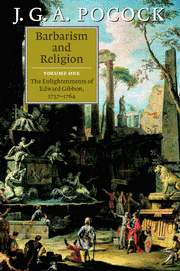Book contents
- Frontmatter
- Contents
- Acknowledgements
- Note on references, quotations and translations
- List of abbreviations
- Introduction
- PART I ENGLAND AND SWITZERLAND, 1737–1763
- 1 Putney, Oxford and the question of English Enlightenment
- 2 Lausanne and the Arminian Enlightenment
- 3 The re-education of young Gibbon: method, unbelief and the turn towards history
- 4 The Hampshire militia and the problems of modernity
- 5 Study in the camp: erudition and the search for a narrative
- PART II THE ENCOUNTER WITH PARIS AND THE DEFENCE OF ERUDITION, 1761–1763
- PART III LAUSANNE AND ROME: THE JOURNEY TOWARDS A SUBJECT, 1763–1764
- Epilogue: Gibbon and the rhythm that was different
- List of references
- Index
5 - Study in the camp: erudition and the search for a narrative
Published online by Cambridge University Press: 15 December 2009
- Frontmatter
- Contents
- Acknowledgements
- Note on references, quotations and translations
- List of abbreviations
- Introduction
- PART I ENGLAND AND SWITZERLAND, 1737–1763
- 1 Putney, Oxford and the question of English Enlightenment
- 2 Lausanne and the Arminian Enlightenment
- 3 The re-education of young Gibbon: method, unbelief and the turn towards history
- 4 The Hampshire militia and the problems of modernity
- 5 Study in the camp: erudition and the search for a narrative
- PART II THE ENCOUNTER WITH PARIS AND THE DEFENCE OF ERUDITION, 1761–1763
- PART III LAUSANNE AND ROME: THE JOURNEY TOWARDS A SUBJECT, 1763–1764
- Epilogue: Gibbon and the rhythm that was different
- List of references
- Index
Summary
We possess the journal – the first of a series Gibbon kept between 1761 and 1764 – which records that his life as a militia officer was also a life of study. It was intended, we gather, to be a daily chronicle of drilling, drinking, reading and reflection, but there are lacunae and passages of retrospection, some filling in periods during which daily entries were not made, others surveying periods of study and even writing. It is partly concurrent with the completion of the Essai sur l'étude de la littérature, which is written in French, the language of the république des lettres; but this journal, unlike its successors, is kept in English, the language of the militia and the political world to which the writer currently belonged. Its value to us is that it continues the record begun by the Lausanne commonplace book; the record of Gibbon's self-training in classical and modern studies, which never quite equipped him to be a classical scholar – the deficiencies of his schoolboy and undergraduate years were not to be overcome – but enabled him to ground his thinking as a modern in the critical study of antiquity. It was this which made him a historian, the thing he says he always intended to be, and the militia journal shows his self-training as a scholar in harness with his search for a grand historical subject.
- Type
- Chapter
- Information
- Barbarism and Religion , pp. 121 - 134Publisher: Cambridge University PressPrint publication year: 1999



